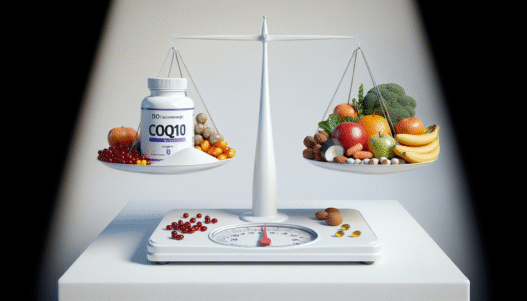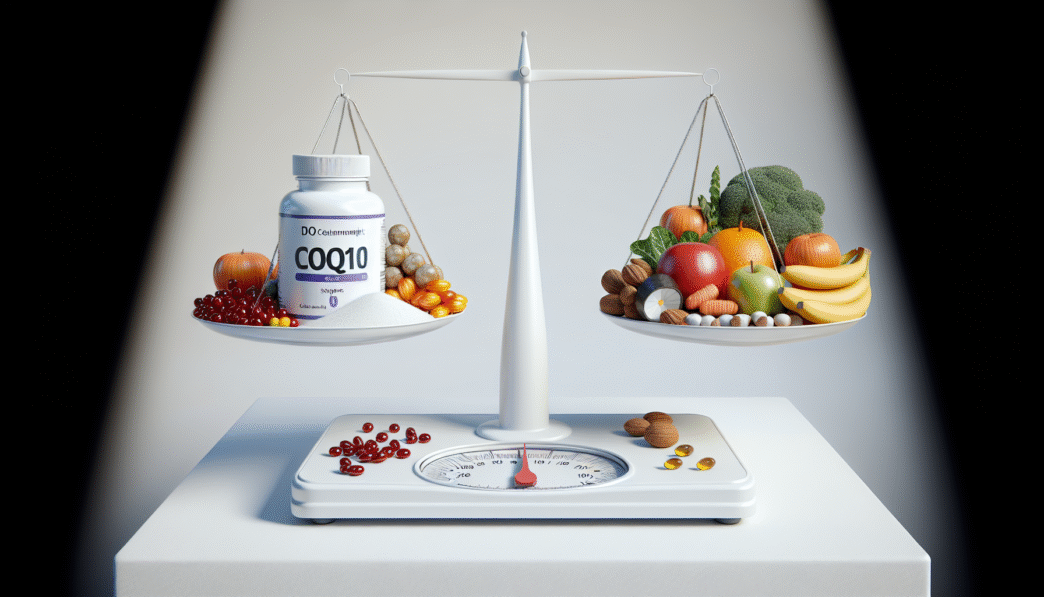CoQ10 and Heart Health
CoQ10, known as coenzyme Q10, is like the little engine that could for your heart. It’s pretty important when it comes to keeping your ticker in tiptop shape, especially when the years keep piling on and health becomes more of a priority — we’re looking at you, folks aged 35 to 65!
CoQ10 Levels and Heart Conditions
Studies show that CoQ10 takes a nosedive in people battling heart disease or popping cholesterol-lowering meds called statins. This opens up a question: Can topping up CoQ10 help folks with heart issues feel better?.
Let’s check out how CoQ10 plays a part in different heart scenarios:
| Heart Condition | Usual CoQ10 Level Change |
|---|---|
| Congestive Heart Failure | Dips |
| Coronary Artery Disease | Dips |
| High Blood Pressure | Dips |
| Healthy Adults | Steady as she goes |
Benefits in Preventing Heart Conditions
Adding CoQ10 to your daily routine might just be a smart move for keeping heart woes at bay or taking the edge off existing ones. Some say CoQ10 is like a multi-tasker for heart health—easing heart failure symptoms and cranking up your heart’s efficiency, plus giving migraine headaches (often linked to heart health) the boot (NCBI Bookshelf).
People with naturally low CoQ10, like those on statins or already dealing with heart issues, might find CoQ10 especially useful. And here’s the good news: CoQ10 is quite the gentle giant, with few side effects when used properly and with a doctor’s green light (Mayo Clinic). If you’re thinking about giving CoQ10 a try, chatting with a healthcare pro first is always a smart move to make sure it fits like a glove with your health needs.
Safety and Side Effects of CoQ10
Coenzyme Q10’s got some buzz because it might be good for keeping you spry and your ticker ticking. Before you start popping these pills, though, let’s check out how safe they are and what side effects could sneak up on you.
Safety Profile of CoQ10
For most folks, CoQ10 is pretty much safe if you follow the rules. It’s an antioxidant your body makes on its own, helping cells grow and stay in tip-top shape. But as we get older, our CoQ10 levels drop, and if you’ve got a heart condition, they might be even lower. To keep things on the safe side, it’s best to have a chat with your doc before adding CoQ10 to your routine. Studies find that side effects are few and far between when you stick with the guidelines (Mayo Clinic).
Here’s the lowdown on CoQ10’s safety:
| Feature | Details |
|---|---|
| Body Production | Yup, your body makes it |
| Decreases with Age | Yep, fewer of those good guys as you age |
| Best Practices | Talk to your doctor before diving in |
| Forms Available | You can get it as capsules, chewable tablets, syrups, and IV stuff |
Possible Side Effects
While CoQ10 is mainly safe, a few folks might get the mild hiccups like nausea, diarrhea, or an upset belly. No need to panic – these are usually easy to handle by tweaking how much you take or munching with your dose. If you’re curious about all the nitty-gritty details, check out our write-up on what are the side effects of taking coq10?.
Peep this table for potential CoQ10 side effects:
| Side Effect | What It Feels Like |
|---|---|
| Tummy Troubles | Nausea, diarrhea, stomach upset |
| Allergies | Rare, but some folks might break out |
| Mixing with Other Stuff | Could mess with how other meds work |
Some people worry about CoQ10 jazzing up their anxiety, but that’s not too common. More on this in our piece on can coq10 increase anxiety?.
If you’ve got a bunch of meds or health stuff going on, definitely get a second opinion from your healthcare provider before jumping on the CoQ10 train. Sure, CoQ10 comes with perks, but knowing about the safety bits and side effects will help you make the best call for your health.
Looking for more info on CoQ10’s effects on other parts of the body? See what we found on whether CoQ10 is hard on the liver and if CoQ10 affects bowel movements.
CoQ10 Interaction with Medications
Exploring how CoQ10 mingles with various meds can be pretty important if you’re thinking about adding it to your routine. It can tinker with meds, especially those managing blood pressure and clotting issues.
CoQ10 and Blood Pressure Medications
This little enzyme, CoQ10, has a knack for dialing down blood pressure. So, if you’re pairing it up with your blood pressure meds, you might find yourself a bit too woozy or light-headed from your pressure dropping low (WebMD). Folks on these meds need to keep an eye on their numbers when they kick off a CoQ10 supplement.
| Blood Pressure Medication | What Could Happen with CoQ10 |
|---|---|
| Amlodipine | Might boost the lowering effect |
| Lisinopril | Might boost the lowering effect |
| Atenolol | Might boost the lowering effect |
Get a chat rolling with your doctor before you throw CoQ10 into your mix of meds to keep things cool.
CoQ10 and Blood Clotting Medications
Now, CoQ10 might tweak how your blood clots, making it thicken slower. That could mean your anticoagulant meds, like warfarin, don’t quite pack the punch they should, upping your risk for clots (WebMD).
| Blood Clotting Medication | What Could Happen with CoQ10 |
|---|---|
| Warfarin | Might make it less effective, more clot risk |
| Aspirin | Probably okay, but better safe than sorry by monitoring |
If you’re using blood thinners, a heart-to-heart with your doc about adding CoQ10 is a smart move to dodge any unwanted surprises.
CoQ10 can pack some health perks, especially for your heart. Still, making sure it plays well with other meds you’re on is key. For the scoop on side effects, check out our article on what are the side effects of taking coq10?.
CoQ10 and Health Conditions
Coenzyme Q10 (CoQ10) is catching people’s attention for its potential perks in dealing with health issues like type 2 diabetes and fibromyalgia. Let’s break it down!
CoQ10 and Type 2 Diabetes
There’s a buzz around studies showing how CoQ10 links to better blood sugar control for those dealing with type 2 diabetes. It’s about keeping a check on what’s called malondialdehyde along with CoQ10 in your blood according to WebMD. Keeping your CoQ10 levels just right might actually help keep your blood sugar levels where they should be.
| Study Focus | Conclusion |
|---|---|
| CoQ10 & Blood Sugar Control | Tighter CoQ10 levels could mean better sugar control for diabetics. |
Taking CoQ10 might also give a boost to your blood vessel health, which diabetics gotta keep an eye on as noted by the NCBI Bookshelf. Those juggling type 2 diabetes might find it useful as a part of their health game plan.
Potential Benefits for Fibromyalgia
Living with fibromyalgia usually means dealing with the double whammy of constant pain and bone-deep fatigue. Popping CoQ10 has been shown to ease these troubles—cutting down that pain and morning exhaustion compared to doing nothing reported by NCBI Bookshelf.
| Symptom | Benefit from CoQ10 |
|---|---|
| Pain | Eased |
| Fatigue | Reduced |
| Morning Tiredness | Brought Down |
For folks wrestling with fibromyalgia, CoQ10 could be a relief, hopefully making life a tad bit more livable.
CoQ10’s benefits stretch across a bunch of health scenarios, especially for adults between 35-65 keen on keeping healthy as they age. Always a smart move to chat with a doctor before jumping onto any new supplement. Curious minds can find more insights on possible side effects of CoQ10 and its wonders for your skin here.
CoQ10 for Anti-Aging
Coenzyme Q10 (CoQ10) is making waves for its possible age-defying perks. This handy molecule, kinda like a vitamin, is super important for energy-making and keeps our cells in tip-top shape. As we get older, CoQ10 levels naturally drop, which might just be one reason our bodies show signs of aging.
Role in Anti-Aging
CoQ10 is the superstar when it comes to making adenosine triphosphate (ATP), the go-to energy source for your cells. A little boost from CoQ10 could help ease some of those pesky aging effects. Getting older often means our cells don’t work quite as well and we’re more exposed to damage from things like pollution and stress. CoQ10 helps tackle these issues by:
- Boosting energy production.
- Improving how cells do their thing.
- Cutting down on damage from things we come across every day.
For the folks worried about the aging process, adding CoQ10 to your routine might be a good move. Research suggests it could even help older adults keep their hearts healthily ticking along and potentially dodge some aging-related health issues (NCBI Bookshelf).
Effects on Aging Concerns
CoQ10 might help with all sorts of aging-related annoyances—low energy, constant fatigue, or aching pain from things like fibromyalgia. It might just be the little helper you need:
| Concern | CoQ10’s Potential Perks |
|---|---|
| Energy Levels | Gives you an ATP boost, making you feel more energetic |
| Fatigue | Might help you feel more awake in the mornings |
| Pain (Fibromyalgia) | Could help dial down the pain perception |
Research shows CoQ10 might help folks feel less worn out and less in pain, which makes it a pretty handy supplement for older adults wanting to feel spry and healthy (NCBI Bookshelf).
Interested in what CoQ10 can do for your skin? Take a peek at our article on what does coq10 do for your face? to get the scoop.
Knowing how CoQ10 could fight the signs of aging helps folks decide if they want to add it to their wellness routine. But, like with any supplement, it’s smart to chat with a healthcare provider first, to understand any potential issues or side effects you should watch out for. Check out our article on what are the side effects of taking coq10? for more on this.
CoQ10 and Weight Management
Let’s chat about CoQ10, the cool kid in the vitamin world, and how it affects your waistline as you wizened folks care more about staying healthy. The chatter often circles around questions like, “Is CoQ10 making me pack on the pounds?” Let’s dig into how CoQ10 might mess or not mess with your weight, plus what some smarty-pants researchers have cooked up about this little compound and obesity.
Impact on Weight Gain
Don’t sweat it; popping some CoQ10 pills isn’t making you balloon up. Science says so! Researchers, with their lab rats who munch like it’s an all-you-can-eat buffet, found that CoQ10 didn’t pile on any extra love handles on these furry test subjects, whether they were lean or chunky monkeys.
Studies on CoQ10 and Obesity
Science heads have poked and prodded into CoQ10’s potential superpowers in tackling obesity. Check out this quick rundown of research findings:
| What They Looked At | What They Found |
|---|---|
| Weight and CoQ10 | CoQ10 didn’t change body weight for our rat buddies, regardless of their size. |
| Metabolic Surprises | CoQ10 didn’t fix the wonky metabolism from obesity but gave a thumbs-up to rat ovaries. |
| Hormonal Magic | Helped balance out hormonal levels and perked up ovaries in those beefy rats (Journal of Ovarian Research). |
So yeah, CoQ10 might not be your magic carpet ride to weight loss, but hey, it scores some points in the hormone and ovary department, especially if you’re tackling the obesity beast.
For the inquisitive souls diving into all things CoQ10 on your wellbeing, peek into its talents on skin care (what does coq10 do for your face?), liver vibes (is coq10 hard on the liver?), and your guts (does coq10 affect bowel movements?). Don’t forget to rope in a doc before you pop those pills when juggling other health quirks.





















